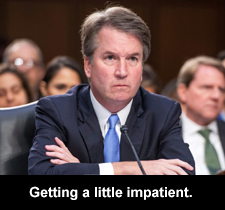Based on their rhetoric of late, it seems clear that, with the economy in very rough shape, the Trump administration is opting for a law-and-order driven campaign for re-election. Trump has always been fond of “tough on crime” rhetoric, partly because he likes to present himself as “tough”, but also because he is very much a product of his 70s, 80s, and 90s heyday when political careers were made and broken on the issue of crime and harsh punishment. He has a base, very rudimentary mentality, and one that is laser focused on visceral political issues. His rally speeches are like fascistic comedy routines during which he trots out tried and true laugh lines that pull directly from his generously proportioned sack of prejudices – the same exclusionary and self-aggrandizing posturing that resonated so deeply with his base in 2016.
Can that work in today’s America? I don’t freaking know. It seems like perhaps not, but maybe it can. All I know is that Trump is simply the most prominent standard bearer of this militarist approach to what’s called “public safety”, not its author. And while the Republican party seems most heavily invested in this madness, it is not their sole province; many Democrats have made their political bones on the …. well, bones of generations of young black, brown, and poor white men and women who populate our prisons and wear the chains of the carceral state after they’re released. Joe Biden is one of them. So is Amy Klobuchar. There are many more.
I recently re-listened to an interview of the well-known advocated for prison abolition Mariame Kaba on Chris Hayes’s podcast, and frankly she blew me away. Her critique of our current mess of a system – a system that fails nearly everyone – is spot-on, in my opinion, and she offers both a vision of a better alternative and a theory of change – in effect, a pathway to the vision. We pour $170 million into law enforcement, almost zero into alternatives to incarceration or community investment, and somehow expect things to improve on their own. And as she points out, it’s a system that does not even succeed on its own terms. Severe punishment for murder is meaningless when only 13% of those who murder are serving time, as is the case in Chicago. And policy built from trauma is almost definitionally bad. That’s how political careers are made – developing laws that punish whole classes of people on the basis of a single crime. That’s what Trump will leverage this fall – count on it.
We need to send Trump back to his shabby golden tower. But we can’t stop there. We have to follow through with what he’s telling his Klan rally audiences is the crazy agenda of the far left: building towards an alternative vision of public safety that provides for minimal application of force and maximal investment in under-served communities. That’s the path to a more just society.
luv u,
jp


 Right down the street, in the heart of the city, people of color face a far different reality. Their opportunities for advancement are severely constrained, and when something goes wrong, it’s either life-changing or life-ending. I think about kids like Hector McClain, who at 16 was sent to prison for four years because he failed to stop two other teens from beating a Utica, NY police officer. Here’s an excerpt of a press report about his trial:
Right down the street, in the heart of the city, people of color face a far different reality. Their opportunities for advancement are severely constrained, and when something goes wrong, it’s either life-changing or life-ending. I think about kids like Hector McClain, who at 16 was sent to prison for four years because he failed to stop two other teens from beating a Utica, NY police officer. Here’s an excerpt of a press report about his trial: